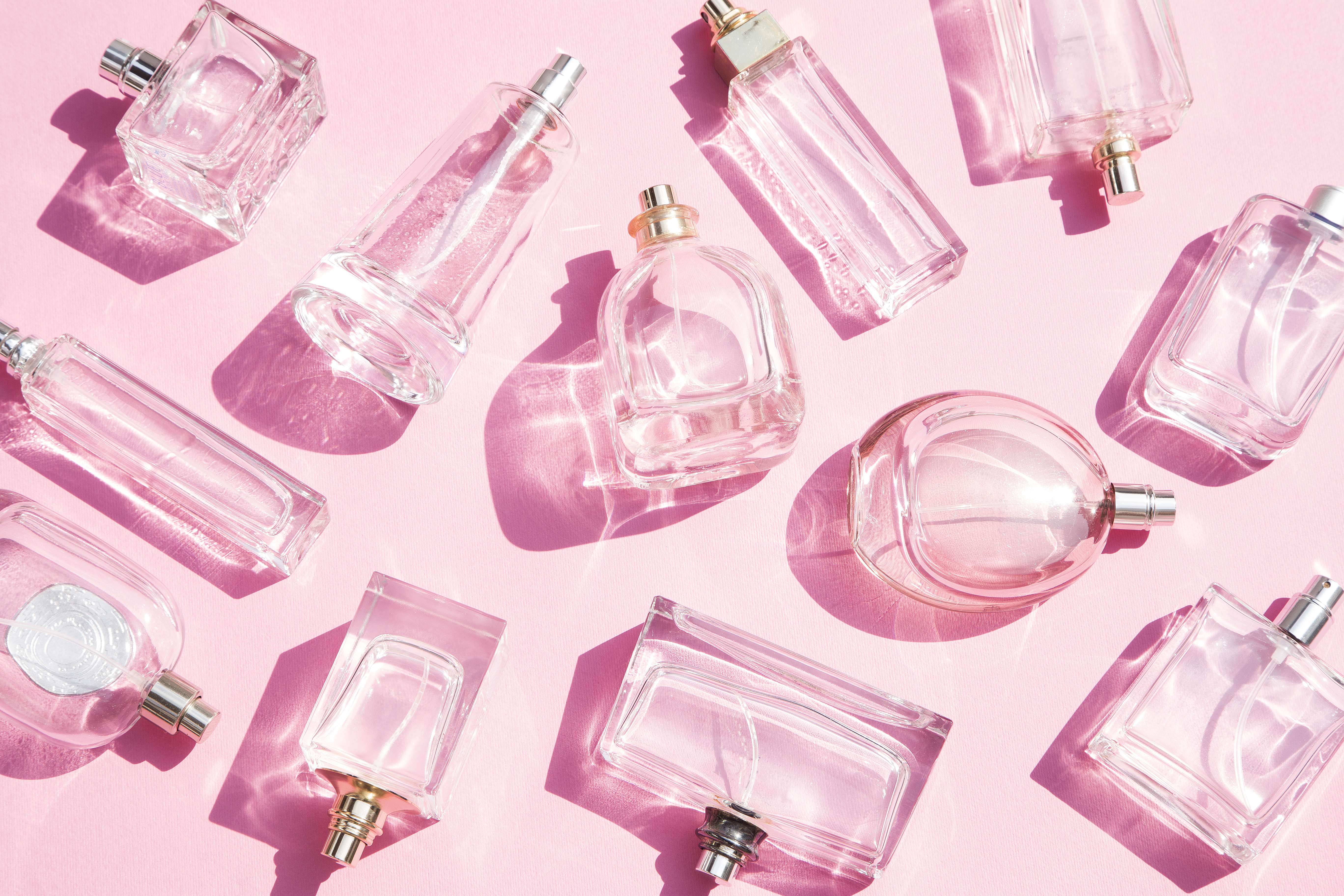
The use of fragrance goes back to the ancient times. For thousands of years, humans have used oils, incense, and extracts to set a mood for events, or to scent their bodies. In those days natural substances like herbs, leaves, flowers, roots, woods, and animal secretions were harvested for their aromas. These same natural materials are still available today, but thanks to modern science and industrial technologies we also have an array of synthetic fragrances to choose from as well. So, which is better? Whether you choose to use naturally derived or commercial synthetic fragrances to scent your body and home, you will have some safety issues to consider; there are benefits to using both essential oils and synthetic fragrances, but they are both hold some potential dangers. Let’s explore both as you consider whether natural or synthetic fragrance is best for you and your family.
Essential Oils
Essential oils are made by harvesting the precious quintessential oils from fruits, seeds, flowers, roots, or leaves of plants. These oils can be obtained through cold-pressing the plant material, steam distillation, or extracted by applying solvents that will separate the oil from the rest of the plant. Essential oils are highly concentrated; not only do they contain a concentrated amount of the nutrients and matter from the original plant material, it also has the spiritual essence of the plants—which accounts for its precious abilities to heal and transmute (change) energy. Most essential oils are very potent in their scent, which is why only a few drops are needed at a time.
Pros
Essential oils are completely safe when used properly. The body recognizes the chemical compounds from essential oils and knows exactly what to do with them. Think about it—many of the oils are from foods that we eat! Don’t you think your body knows what to do with lemon oil? Or peppermint? Essential oils also have a natural, clean scent that is not as irritating to bystanders as chemical fragrance can be. Natural perfume smells better to most people. The molecules you inhale when you smell essential oils has an effect on your brain and nervous system—that is what aromatherapy is—you can relax, relieve stress and tension, or become aroused and energized by your perfume!
Cons
But with this high concentration and bioavailability of essential oils come safety concerns; essential oils cannot be applied directly to the skin. Some oils like lavender can be applied neat, but personally I don’t recommend that for my customers. Essential oils can burn the skin if applied incorrectly, or cause short or long-term skin sensitivity. Some essential oils, like citrus oils are phototoxic when extracted through the cold press method—meaning that UV light or direct sun exposure can cause a bad skin-reaction.
Extended-use of essential oils at high concentrations can overwhelm the liver or other organ systems as well, so it is important to follow the manufacturer’s instructions for appropriate use. Pregnant women or children cannot use some essential oils, although children can use certain oils safely at low concentrations.
Since essential oils are so bioavailable, they break down a lot faster than synthetic perfumes. You can’t apply Essential oils to your skin at 8:00 am and expect to be able to smell it at 12:00 pm. Essential oil molecules are very small; they evaporate and are absorbed into the skin very quickly. If you want to smell sweet all day long, you need to reapply your product. I recommend re-applying essential oil based fragrance no more than 2-3 times a day, for everyday use. Sprays can be used more often, as less product enters the body through inhaling than direct skin application.
Synthetic Fragrance
Most synthetic fragrances are made from petrochemical byproducts and other man-made chemicals. Chemicals are used to mimic the chemical structures of substances that occur in nature. The jury is still out on whether or not these products are safe. So far, the research is suggesting that they are not. At this time, corporations and the FDA are making it difficult for consumers to protect themselves against potentially harmful chemicals used in perfumes. Currently, the law states that companies do not have to disclose any chemicals or substances that supply aroma in a product because they are “trade secrets.” This means that a company could use 100 different chemical aromatic agents in a product and it will only appear as “fragrance” on the label. This is completely legal—it protects the corporation from losing money due to competition from knock-off products, but it does not protect consumer health.
Pros
Synthetic fragrance contains stabilizing agents that help the fragrance last longer; when you apply commercial perfumes, the scent is stronger and will remain on the skin longer than most natural essential oil-based perfumes. Also, chemicals are almost always cheaper than their natural counterparts—with the exception of designer label perfumes, commercial products that use synthetics are usually cheaper than essential oil based fragrances.
It is also easier to create scents that would be difficult to make with essential oils. For example, chocolate, melon, and berries don’t create essential oils. They can produce an extract, but they are light in scent and would be overpowered by the other scent agents and the alcohol used in a perfume.
Cons
Have you ever been out in public and someone passes by you with a scent that just assaults your nose? Most likely they were wearing synthetic perfume. Synthetics can be very strong, and irritating to people who have allergies or sensitivity to fragrances. They have an unnatural chemical after-smell that can be off-putting. But the biggest issue with synthetic fragrance is safety issues. Since these chemicals contain a lot of stabilizers, they can be less irritating to skin than essential oils for some people, yet other people have strong skin reactions to synthetic fragrances but not essential oils. Its’ the long-term effects of synthetic fragrance that is of most concern; the body does not recognize these materials and does not always know what to do with them. The liver usually stores them within itself or fat cells to get them out of the bloodstream where they can do a lot of damage. If they do enter the bloodstream the immune system can sometimes store them in joint and connective tissues, causing long-term harm. The body recognizes essential oils—and while using them incorrectly can harm the body, the molecules are so easy to break down that the liver has no need to hide or store them, unlike the chemicals. Chemicals commonly used in fragrances have been found in human body fat, organs, breast milk, and in blood of adults and babies.
Despite what the product label may say, products made with synthetic fragrances do not have a true aroma-therapeutic effect. For example, when a molecule of lavender is inhaled into the nasal cavities and lungs, the brain recognizes it, and the nervous system reacts accordingly, bringing about a physical or emotional response. When a synthetic lavender molecule enters the body, the brain recognizes it only by its association to the scent of real lavender oil—so there is some effect, but it isn’t a real neurological reaction that would stimulate healing.
Some commonly used chemicals found in fragrances are known carcinogens and are banned from use in skincare products in other countries:
Benzophenone
Benzyl Benzoate
Butoxyethanol
Diethyl Phthalate (Phthalates are banned in Canada, Europe, Japan, South Korea and China, but still legal in the USA).
Dioxane
Formaldehyde
Methyl & Propylparabens
Common Health Problems associated with these chemicals:
Allergen
Carcinogen
Endocrine disruptor
Skin inflammation
Potential hormone disruptor
Nervous system damage
Liver damage
Kidney damage
Respiratory irritant
To close, there are pros and cons to using both essential oils and synthetic fragrances. It appears that essential oils can pose short-term health threats that are evident to you right away (like a skin irritation), and synthetic fragrances build up in the body and cause long-term problems without your awareness. What I like about essential oils, is that you will know right away if it works with your body or not—essential oils break down very easily in the body, so any negative reaction should be short-lived and cause no long-term effects. A responsible natural perfumer will be aware of the correct concentrations of oils to use in its products to guarantee skin safety. So, using essential oils are very safe as long as you follow the manufacturer’s directions.
Wild Purple Energy uses 100% essential oils for all of our products, with the exception of the shower bombs and candles. Shower Bombs do not touch the skin and are made with 75% essential oils and 25% phthalate-free synthetic oils, candles are about 50% essential oils and 50% synthetic oils.
